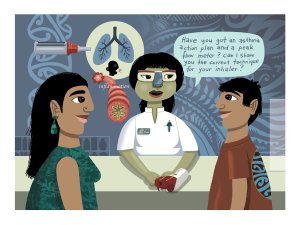Academic pharmacist Nataly Martini discusses the medical management of asthma in adults and adolescents, which has evolved to prioritise early anti-inflammatory treatment. She also explains how to improve patient outcomes by proactively identifying poor asthma control and supporting equitable access to education and treatment
Summary of Te Aka Whai Ora and Te Whatu Ora joint board meeting outcomes
Summary of Te Aka Whai Ora and Te Whatu Ora joint board meeting outcomes
Chair of Te Aka Whai Ora Tipa Mahuta (Waikato, Maniapoto, Ngāpuhi) and Chair of Te Whatu Ora Rob Campbell:
Our joint boards met this morning in Tāmaki Makaurau for a scheduled quarterly session. The boards noted the importance of a strong and open relationship and discussed future working process in this context.
Te Aka Whai Ora outlined the approach it proposes to take in its monitoring role of Te Whatu Ora under the Pae Ora legislation. We agree that this forms a joint and vital role for accountability for equity for Māori. This will be formalised, made consistent with the monitoring role of Manatū Hauora - Ministry of Health and other accountability reporting, then made public.
Great care is being taken to have clarity about everything from objectives to data collection to reporting to action on outcomes. We see this as important for communication about the Pae Ora reforms and building support for future change.
The boards discussed a draft Ngā Tikanga o Ngā Waka covering conduct of our relationship including strengthening the developing partnership based on Te Tiriti. When completed after management review and confirmation of operational process, this will be publicly released. This discussion also covered the Waka Hourua model for the relationship and deepened the mutual understanding of this model where the two waka work in co-ordination towards an agreed destination, leading a wider fleet of other health services.
The boards discussed operation of the vital commissioning roles which they have and the areas and our approach to co-commissioning services. Co-commissioning will be in areas where both boards agree that outcomes will be improved in terms of equity and efficiency by such an approach. The discussion focused on the principles to be applied in selecting these areas and the ways in which such co-commissioning will work. When finalised these principles will be made public. We noted that operationally the teams from both organisations are working together effectively already.
The boards covered current workforce issues including issues relating to the Māori workforce such as kaiāwhina and their importance to future services. We noted that with significant primary workforce funded by Covid-19 response which is currently scheduled to end in coming months there is some urgency.
Work is also being done for the joint boards on the way in which to retain and further develop key skills and services in primary care. This work will proceed in close consultation with the professional organisations and unions. We also noted that reorganisation will require substantive shifts in workforce location and roles.
A particular focus was the vital issue of mental health and addiction services. Te Aka Whai Ora has a particular initial focus on suicide prevention, tamariki me rangatahi ora, and strengthening kaupapa Māori mental health services. We share the urgency of lifting services and facilities for mental health.
Tipa Mahuta contributed a background kōrero on the mana whenua of the location within which the boards met, and the wider rohe and history of Waikato-Tainui. The boards also recognised the passing of Tā Toby Curtis and the arrangements being made for participation with Crown representatives in the Koroneihana on 20 August.





